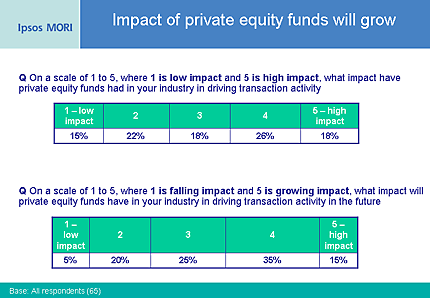Analysts and the Euro
Cohn & Wolfe commissioned MORI to produce this study as part of a strategy to promote the work of Deloitte Consulting in euro-related projects. This specific project is intended to generate brand publicity on a pan-European basis and demonstrate expertise and insight into the implications of the euro's introduction.
Key Findings
- The euro is predicted to have a fundamental impact upon the European business environment. In the main this impact is considered to be positive. A large majority expects the euro to have a "very" or "fairly positive" impact upon the European business environment in both the medium and long-term. Analysts based in France, Germany and Italy are especially convinced of this.
- It is believed that not only will the euro improve the overall business environment but that, in the long-term, companies will benefit directly from its introduction, either a "great deal" or "a fair amount".
- Among the greatest benefits envisaged are: reduced risks and costs associated with currency transactions; the creation of larger, pan-European markets; a more stable business environment; general cost reductions; opportunities to compete more effectively; and a reduction in the cost of capital.
- It is further envisaged that the euro will act as the catalyst for companies to embark upon a great deal of internal change. Clear majorities agree that the euro will create opportunities to: centralise purchasing functions, thus improving purchasing power and efficiencies; make their distribution more efficient; and create new opportunities in sales and marketing. In summary over two-thirds agree that the euro will "affect the organisational structure of companies".
- The survey's overall tone is one of positive endorsement of the euro. However, it is predicted by over four-fifths that while there will be gains in the medium and long-term, the euro will involve substantial short-term costs to companies. A similar proportion also expect margins to be damaged.
- Part of the short-term costs involve the resolution of IT related issues. This is widely recognised, with nine in ten analysts agreeing that the need to be euro (and Y2K) compliant is placing major strains on companies' IT resources and budgets. They are also of the view that many companies have not yet resolved the IT implications of the euro. This opinion is held very strongly by UK analysts.
- The survey indicates that, even at this relatively late stage, both the financial markets and companies themselves are unsure of how the euro will impact upon business. It is striking that over two-thirds of analysts felt that "generally the markets do not know what impact the euro will have on company profitability and competitiveness". This is especially so among UK -based analysts.
- In general analysts feel that they "need to know more about how the euro will affect the strategy and performance of companies in their sector" but in the absence of greater levels of information they are already considering the euro's impact when assessing their sector or individual companies within it. Moreover, most believe that over the next three years the euro will become increasingly important when making these assessments.
- If companies are to enjoy favourable ratings from analysts, it will become increasingly important to demonstrate a sound euro-related strategy. Even with limited knowledge, judgements are being made and it is therefore imperative for companies to communicate exactly how they are approaching the challenge represented by the euro. However, while clear strategies are deemed important, it is the analysts' view that many companies have not yet, even at this late stage, established them. Or, if they are in place, they have not been well communicated.
- Retail Financial Services is a sector expected to gain substantially from the introduction of euro and, according to this sample, companies in this area have done more than most to consider its implications. A majority also expects the Manufacturing and Retail sectors to benefit at least a fair amount.
- Among French, German and Italian analysts over two-thirds expect the retail sector to be advantaged as a result of the euro's introduction. Meanwhile, UK analysts are less convinced that individual sectors will benefit, but are more inclined than average to predict that Pharmaceutical companies will be advantaged.
Implications
- Following the launch of the euro on January 1st 1999, the environment for businesses trading either with, or within, the euro-zone will be fundamentally altered. Potentially this will bring enormous benefits to companies, but in order to take advantage both the structure of companies and the strategies they adopt will need to be changed.
- Analysts are acutely aware of the impact of the euro. They are already factoring the euro into their assessments of sectors and companies and this will increasingly effect their judgements. If companies are to enjoy favourable assessments they must develop clear euro-related strategies. Perhaps more fundamentally though, once adopted, it is imperative that these strategies are clearly communicated to this audience. Given the loosening of restrictions upon the geographical structure of investment portfolios it is even more important that companies communicate their value and growth strategies to the investment community.


Technical details
This document contains the findings of a research study conducted on behalf of Cohn & Wolfe (acting for Deloitte Consulting) by MORI. It is based upon a total of 100 telephone interviews with analysts based in the UK, France, Germany and Italy. Interviews were completed between 3rd and 25th November 1998 by MORI's specialist telephone interviewing company, On-Line. Data are edited and unweighted.
Allan Hyde, Robert Carlisle, December 1998 169



